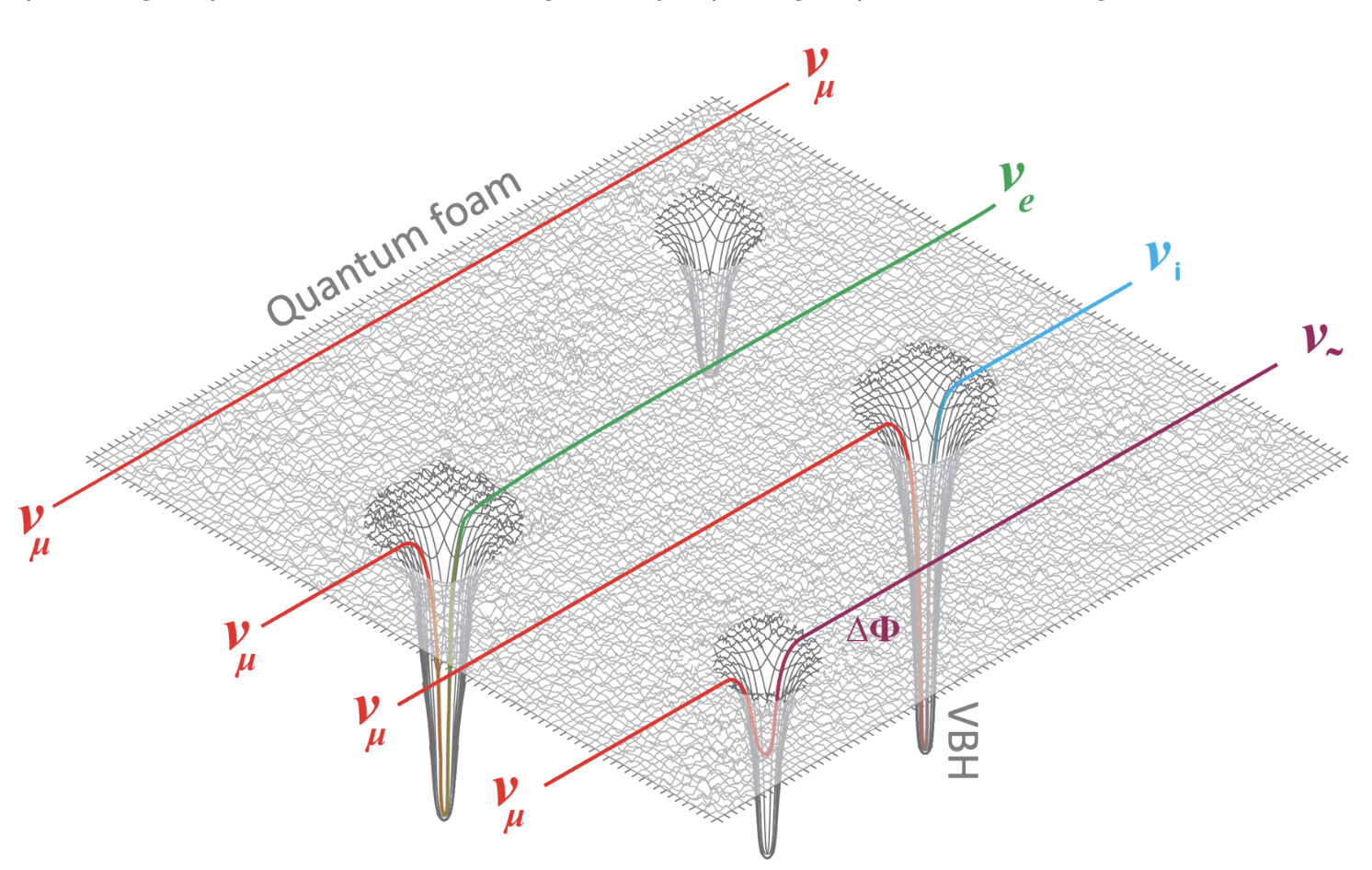Insider Brief
- Researchers reported on the stringent constraints on potential quantum fluctuations of spacetime itself.
- The team used high-energy neutrinos detected by the IceCube experiment to look for any loss of coherence in the neutrinos’ oscillating flavor composition as they traveled across billions of light-years.
- A better understanding of decoherence could also impact quantum technologies that rely on harnessing quantum coherence.
- Image: IceCube tests for fluctuations in the metric of spacetime that would break the normal rules of quantum mechanics for propagating neutrinos. The above graphic shows neutrinos interacting with virtual black holes fluctuating from the metric of spacetime, one possible mechanism of coherence loss. Credit: IceCube Collaboration
Researchers from the IceCube Neutrino Observatory at the South Pole have reported new, stringent constraints on potential quantum fluctuations of space-time itself. Although it’s not central to the study, because the findings peer into the fabric of spacetime and examine the properties of decoherence, it’s not a stretch to think that the results may have implications for quantum information science.
The team used high-energy neutrinos detected by the IceCube experiment to look for any loss of coherence in the neutrinos’ oscillating flavor composition as they traveled across billions of light-years from their cosmic sources to Earth. Their results, published today in Nature, found no such decoherence down to extraordinarily small scales.
The paper points out that Neutrino oscillations at the highest energies and longest baselines can be used to study the structure of spacetime and test the fundamental principles of quantum mechanics. Neutrinos oscillate between different flavor states — electron, muon, and tau — as they propagate, governed by the rules of quantum superposition. However, some theories suggest space-time may experience quantum fluctuations at the extremely tiny Planck scale of 10^-35 meters that could cause particles like neutrinos to lose their coherence prematurely over long distances.
The researchers explain in the paper, “If the metric of spacetime has a quantum mechanical description, its fluctuations at the Planck scale are expected to introduce non-unitary effects that are inconsistent with the standard unitary time evolution of quantum mechanics. Neutrinos interacting with such fluctuations would lose their quantum coherence, deviating from the expected oscillatory flavor composition at long distances and high energies.”
To test this idea, the IceCube collaboration analyzed atmospheric neutrinos with energies between 0.5-10 TeV that had traveled billions of light-years before being detected at the South Pole.
Their results showed no evidence for any anomalous loss of coherence.
“We find no evidence of anomalous neutrino decoherence and determine limits on neutrino–quantum gravity interactions,” the study reports.
Those limits derived from this analysis are extremely constraining, according to the researchers, who state: “The constraint on the effective decoherence strength parameter within an energy-independent decoherence model improves on previous limits by a factor of 30.”
Even more impressively, for decoherence models where the effect scales quadratically with neutrino energy, the new IceCube bounds represent a major advance compared to previous constraints.
“Our results are over a million times stronger than the previous ones in well-motivated parts of the parameter space,” Benjamin Jones, an associate professor at the University of Texas at Arlington (UTA), who co-led the analysis, said in a story on the observatory’s website.
The study points to the use of neutrinos as an extremely sensitive probe of quantum space-time and potential deviations from standard quantum mechanics at the smallest scales. Besides testing fundamental physics, a better understanding of decoherence could also impact the development of quantum computing and quantum information processing technologies that rely on harnessing quantum coherence.
The results of the study have other implications. For example, they allow physicists to place extreme bounds on theoretical models attempting to unite quantum mechanics and gravity. The observed persistence of neutrino coherence over cosmic baselines suggests the quantum nature of space-time may only become apparent at even smaller distances than previously contemplated.
This is just the beginning the researchers report in the website article, saying a larger dataset and more precise measurements will promote the search for evidence of new physics beyond the Standard Model.
“In the area of quantum gravitational decoherence, the IceCube constraints are now sufficiently strong that it is unlikely that any neutrino experiment will surpass their sensitivity in the near term,” said Jones. “As such, tests of gravitational decoherence will need to focus on other particles, such as electron, photon, or atom interferometry.”
The analysis was also co-led by UTA PhD student Akshima Negi, assistant professor at the Niels Bohr Institute Tom Stuttard, and former UTA PhD student Grant Parker.

Wanda Parisien is a computing expert who navigates the vast landscape of hardware and software. With a focus on computer technology, software development, and industry trends, Wanda delivers informative content, tutorials, and analyses to keep readers updated on the latest in the world of computing.


